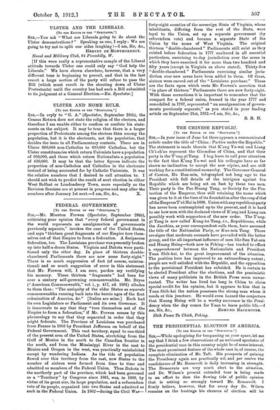THE CHINESE REPUBLIC.
[To Tun EDITOR OF THII "SPECTATOR."] Sxn,—In your issue of June 1st there appears a communicated article under the title of " China : Parties under the Republic." The statement is made therein that K'ang Yu-wei and Liang Ch'i-ch'ao represent the Girondins of China, and that their party is the T'ung-yi Tang. I beg leave to call your attention to the fact that K'ang Yu-wei and his colleague have so far shown no inclination to accept the new regime, and are still working for a constitutional monarchy. The Governor-General of Canton, Hu Han-min, telegraphed not long ago to the President with full details of the intrigues against the Republic which are being set on foot by these two men. Their party is the Pao Huang Tang, or Society for the Pro- tection of the Emperor, thus still retaining the name which was given to it at the time of its foundation after the coup d'etat of the Empress T'zfi Hsi in 1898. Union with any republican party has never been contemplated up to the present, and it is hard to see how men with the declared views of K'ang and Liang can possibly work with supporters of the new order. The T'ung- yi Tang is now called Kung-ho Tang, i.e., Republicans, while the Jacobins, as your correspondent calls them, have assumed the title of the Nationalist Party, or Kuo-min Tang. There are signs that moderate counsels have prevailed with the latter group, and the all-important influence of men like Sun Yat-sen and Huang Hsing—both now in Peking—has tended to effect a rapprochement between the Nationalists and President Yuan Shih-kai, to the great improvement of the situation. The position here Las improved to an extraordinary extent; people are well satisfied with the Republic, and the opposition to the provisional President has subsided. He is certain to be elected President after the elections, and the pessimistic views of many publicists in the British Press seem unwar- ranted. The writer has lived too long in China to claim special credit for his opinion, but it appears to him that in Yuan Shih-kai the nation possesses the strong man whom it needs at this juncture. He would even hazard the conjecture that Huang Using will be a worthy successor in the Presi- dency when the day comes for Yuan to leave public life.—I am, Sir, &c., EDMUND BACKHOUBIL Shih Puma Ta Chieh, Peking.


































































 Previous page
Previous page